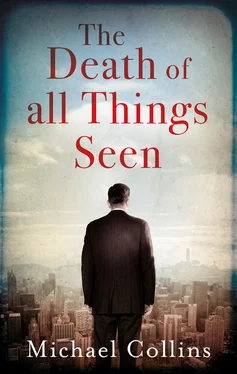It was a complicated association. As Saul put it, a hypnotist could not make a man do what he didn’t want to, but a hypnotist could call upon what was within a person. And Saul, a reader of the Old Testament, fell upon the story of Daniel and told it to Einhorn — how it was some trick, how the Daniel of the Bible put his head in the mouth of a lion, and that it required great faith, and that he, Saul, could tell Einhorn had come from a people who were used to putting their heads in the mouths of lions. It was decided then, not by Einhorn but by Saul, how the relationship would unfold.
*
On the appointed afternoon of the engagement offer, Saul was down in the baths at the Union League Club. He had insisted Einhorn join him before dinner, Saul, then, in the company of a gracious Czech named Pavel Mateˇjcˇek, a valet wearing a white smock. Since his arrival in America, Pavel had spent his days folding towels and robes and filling up plastic cups with mouthwash and setting out talcum powder and deodorant for the members of the Union League Club. He was a permanent fixture who affirmed certain truths for Saul, namely that the poor were necessarily dependent on the rich for their livelihood, and the best of them understood this.
It was perhaps Pavel’s greatest gift, and why he was still alive when others had been less fortunate under Soviet occupation, and yet, in America, for all his abiding belief in free markets, Pavel Mateˇjcˇek would eventually lose everything to Saul’s Ponzi scheme. In fact, it was partly Pavel’s money that was paying for dinners and expenses upon which he never would have dreamt of spending his money.
Pavel held a towel toward Saul, who, dripping wet, was pink as a lobster in a mill of men coming and going from the showers in a billow of steam; men of great means, like fat babies, cherubs just born into the world by some monstrous, smoking machinery.
Saul was in the process of a joke. He could and did tell the most subversive of jokes, usually about his own people, which made it all the more scandalous and unnerving.
Saul began again, for Einhorn’s sake, and for two other fat men who appeared and were given towels by Pavel.
‘Moscow, in deepest winter. A rumor spreads through the city that meat will be available the next day at a Butcher’s Shop. Hundreds arrive. They carry stools, vodka, and chessboards. There is great excitement. At 3 a.m., the butcher comes out and says, “Comrades, The Party Central Committee called. It turns out there won’t be meat for everyone. Jews go home.” The Jews leave. The rest continue to wait. At 8 a.m., the butcher comes out again: “Comrades, I’ve just had another call from Central Committee. It turns out there will be no meat at all. You should all go home.” The crowd disperses, grumbling all the while, “Those bloody Jews, they get all the luck!”’
*
At the time of the proposal, Einhorn was circulating an aggrandizing story about an alleged relationship with a Rockefeller heiress he had dated a year earlier while at Yale. Saul had the story vetted, he made it his business to investigate these sorts of claims in the cut-throat business of Finance. It was key to unraveling the psyche of potential clients. He discovered it was more Einhorn’s dumbstruck infatuation with a Rockefeller grand-niece he had met at a party on the Upper East Side.
Saul dropped the grand-niece’s name amidst the hum of dinner, while attempting to pour the last of a second bottle of Bordeaux. Einhorn put his hand over his glass with a decided temperance. The evening had gotten away from him, Saul’s eyes flashing anger as he continued pouring, the Bordeaux drenching Einhorn’s cuff-linked wrist, so it wasn’t altogether apparent whether Saul knew what he was doing or not, but of course he had.
According to Saul, there were only so many people of means in the world. Einhorn had to understand this, and there were even fewer Rockefellers, and they were a damnable breed of bluebloods and anti-Semites, and he knew every one of them by name, and it was his business to divest them of as much of their money as humanly possible.
He mentioned the Rockefeller grand-niece by name again. Einhorn said nothing. It was thus established that Einhorn was a liar, and it didn’t matter, just that it was understood between them that he was, in fact, a liar. He was thus chastened. As Saul put it, ‘One thing you can’t do is to pull the wool over Saul’s eyes.’
Saul and his people were old hands at history. They had survived the rise and fall of empires, the Roman, the Byzantine, the Ottoman and the scourge of countless pogroms. They had experienced the best and the worst of times. They had been roused, beaten and dragged from their homes, starved and kicked around Europe, and then they had found America and Wall Street.
*
Elaine was still asleep. Einhorn thought of speaking over the intercom for the revelation of his voice, but she wasn’t his preoccupation anymore. He left his office and stood in the kitchen along the annex to what had been his son’s and then his eldest daughter’s apartment. They had coveted privacy and independence long before they ever left home. He had been a good provider, but a lousy father. He would submit to this.
He used a pay-as-you-go cell phone to contact his lawyer. He called from inside a walk-in cedar closet with the mordant understanding that this was how it happened in horror movies, so the only option was the closet when the monster was in the house.
He shut the door behind him. He stood amidst his daughters’ clothes from years earlier, the rows of imported cashmere cardigans, the Izods in the pastel colors and pop-up collars that were no longer in fashion, along with the obscene number of dresses, shoes, boots, sneakers and sandals, many in their original boxes, never worn, or worn once. In their totality, they suggested a great fraud had been committed, in the way Imelda Marcos and her three thousand pairs of shoes had sparked true moral outrage in a world grown too accustomed to mass graves.
What Daniel Einhorn had to do was not to believe most things that were said about him and his kind and, furthermore, to protect his family by surrounding them with like-minded frauds, in a confederacy of entitlement, in a string of Day Schools where each measured what they had against those who had as much, if not more, so a child could say without reproach, ‘Why don’t we have what they have?’
They were not easily understood, the feelings of the privileged, but they could and did feel a genuine hurt that at times life wasn’t turning out as it should and that there were things as yet beyond their reach, and that $40 million was, in fact, not nearly enough money, so the hurt of a child, no matter how misguided, was still a genuine hurt, and they, the children, were essentially blameless and needed unequivocal protection. They were victims who didn’t seem like victims, and, when justice was meted out, they were the ones most often scorned, when they were a symptom and not the problem itself.
He might have begun his defense thus, in the relative comparison to what others had — well, not the majority, but in relation to those who mattered. He could not account for those who had few aspirations and even less drive, for it was an undeniable fact that, despite what it said in the Declaration of Independence, all men were not created equal. He believed this in his heart — not that men could not aspire to greatness, but most did not. That was a crime in itself. Nothing had come easy.
*
Einhorn spoke to his lawyer in the whispering voice of someone contemplating suicide, staring through the slats in the porthole window, a cold eye fixed on the desolate expanse of lawn and a covered swimming pool and pump house that had cost the earth, which nobody used, or hardly ever used.
Читать дальше












